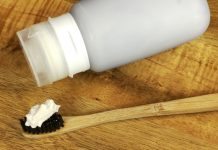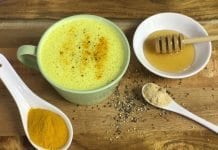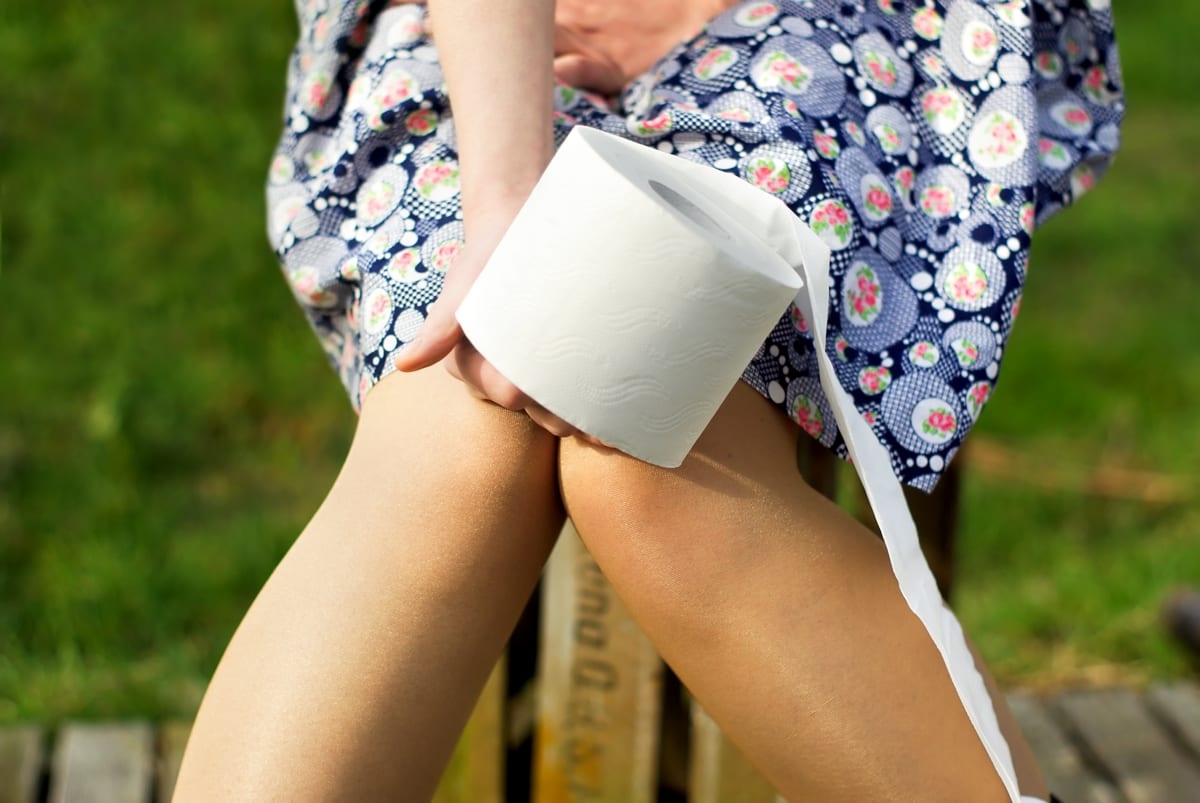While we might not hesitate to tell someone we have a sore throat, it’s not likely that we would openly admit that we are constipated! Constipation, whether we like it or not is a fact of life. It comes and it goes, but for some, it stays for too long. Never fear, these 8 Natural Remedies for Constipation should have you moving in no time.
What Is Constipation?
Up to 20% of the population suffer from Constipation. Usually, when someone experiences constipation they suffer any of these symptoms:
- Bowel movements occur every few days instead of once to three times per day.
- Even when the urge to go appears, bowel movements are hard to pass and cause pain.
- Stools are usually hard, dry and pea size.
- There is no real feeling that your bowel has emptied.
What causes Constipation?
Constipation can be caused by many things. Another illness, medication, antibiotics, a change in diet or a diet lacking in fresh vegetables and fruit, supplements, pregnancy and physical inactivity to name a few. Constipation can also be a symptom of conditions such as IBS, SIBO, Coeliac Disease and other gut related or autoimmune conditions. It can also be age-related. When my son was a small person, he had extreme constipation. Often he would not pass any stools for 4-5 days at a time. I tried many things at the time but often had to resort to Parachoc, which was a medication of liquid paraffin. While this wasn’t ideal, it did the trick, until I managed to get him to eat more food that would help promote a healthy bowel movement. Children who tend to have a minimal menu of foods that they enjoy can experience irregular bowel movements as there is not enough bulk or fiber in their diets. The same can be for elderly people. Due to their eating patterns changing, a drop in appetite, and medications to treat other issues, the elderly often have irregular bowel movements. Regardless of how constipation came about, one thing is a given – constipation can be painful, debilitating and can cause other problems like inflammation and damage to the gut lining. If you think that your constipation is caused by a gut disorder check out my Starter Pack for Treating Leaky Gut.
What treatments are available for Constipation?
There are many over the counter medications commonly referred to as laxatives, that are sold at your pharmacy or chemist. Most of these, however, will cause other side effects. One thing to remember is that your bowel movement is different to others (not that we go around comparing). Some folks can manage 3 times a day. Others manage 5 times a week. There is no one rule for all here. It might be ideal if your bowels move 3 times a day, but it doesn’t mean going once per day is considered wrong. It’s more about the stool type and whether there are accompanying symptoms.
Side Effects of Laxatives
There’s no doubt that when constipation gets out of hand, it is a matter of sanity that has you running to the store for a laxative solution. Laxatives, however, can pose two major problems. Dependency and decreased bowel function to start with. In other words, your bowel movements will only occur with the use of a laxative. And that brings on another set of problems.
In the laxative world you have a few different options to pick from:
- Osmotics
- Bulk Formers
- Softeners
- Stimulants
| How they work | Side effects | |
|---|---|---|
| Oral osmotics (Milk of Magnesia, Miralax) | Draw water into the colon from surrounding body tissues to allow easier passage of stool | Bloating, cramping, diarrhea, nausea, gas, increased thirst |
| Oral bulk formers (Benefiber, Citrucel, FiberCon, Metamucil) | Absorb water to form soft, bulky stool, prompting normal contraction of intestinal muscles | Bloating, gas, cramping or increased constipation if not taken with enough water |
| Oral stool softeners (Colace, Surfak) | Add moisture to stool to allow strain-free bowel movements | Electrolyte imbalance with prolonged use |
| Oral stimulants (Dulcolax, Senokot) | Trigger rhythmic contractions of intestinal muscles to eliminate stool | Belching, cramping, diarrhea, nausea, urine discoloration |
| Rectal stimulants (Bisacodyl, Pedia-Lax, Dulcolax) | Trigger rhythmic contractions of intestinal muscles to eliminate stool | Rectal irritation, stomach discomfort, cramping |
Chart courtesy of Mayo Clinic
According to the Mayo Clinic, Bulk formers are the only safe laxative to take long term. I wouldn’t agree, especially if constipation is a symptom of gut imbalance or dysfunction, such as IBS or SIBO. Fiber supplements tend to irritate the gut lining which creates inflammation. Fiber supplements also contain FODMAPS which in regular doses can exacerbate the gut and the lining and cause more constipation.
So before you go racing off to the store for those laxatives, test out some of the following:
Increase your physical activity – if you don’t have any exercise routine in place, then simply walking for 30 minutes a day will improve your overall health and should get the bowels moving.
Look at your diet – are you eating 80% vegetables, a healthy dose of fats and oils and a variety of protein. Grains can work both ways. They can provide you with fiber but they can also cause problems if you have a gut imbalance. Eat them with caution. Also the same with nuts and seeds. They can provide great fiber but can also aggravate the gut lining.
Drink plenty of H2O – We all know we need to drink an adequate amount of water, but for some reason, we have to be reminded many times. Drinking water is harder for some as they simply don’t like the taste. Try adding lemon (good for the digestive system), cucumber slices or strawberry slices to jazz your water up.
If you have these things in place but your bowel still needs a nudge then try the following:
8 Natural Remedies for Constipation
1. Lemon Juice – The humble lemon does wonders for a sluggish digestive system which often can be a cause for constipation. The citric acid in the lemon acts as a stimulant and provides a natural form of digestive enzymes for the gut. Get things moving first thing in the morning with a glass of warm water and the juice of half to one whole lemon. Take it 30 minutes before eating. Sip on lemon water throughout the day by adding lemon slices or juice to your filtered water. For a great summer treat, freeze freshly squeezed lemon juice in ice cube trays and pop a couple into a glass of filtered or mineral water as a refreshing treat.
2. Slippery Elm Powder – Slippery Elm has been known for quite some time as a herbal remedy for all types of ailments. It’s most important quality is that it contains mucilage, a substance that when mixed with water becomes a gel. The healing property of this mucilage is what makes Slippery elm ideal for applying to many parts of the body, but especially the mouth, throat and the gut lining. It has a soothing effect on any areas that are inflamed such as a sore throat or a perforated gut lining, such as a leaky gut. Taking it mixed with water before eating can greatly improve bulk of the stool and provides an ease of transit, which should reduce pain associated with constipation. Check out the other recipe under Chia/Linseed Jelly.
3. Resistant Starch/Fibre – Resistant starch is an undigestible starch which reaches the colon intact and feeds the trillions of bacteria that reside there. Feeding your gut bacteria leads to a healthy colon and consequently better bowel movements. If constipation is a symptom of a gut imbalance then improving your microbiome is going to be beneficial to relieving constipation. Read more about Resistant starch and find some recipes.
Resistant Starch: What is it and Why you need it?
Dietary fiber such as nuts, vegetables, and rice are also helpful for shifting constipation. I don’t recommend fiber supplements such as Metamucil or Physillum Husk as they can be quite harsh on the lining of the gut, especially if you have any other gut-related disorders. The key with taking resistant starch or dietary fiber is to begin taking small quantities. Adding banana flour or coconut flour to a smoothie or to a meal is often a good way to start. A small handful of nuts, raw vegetable sticks or 1/2 cup cooked and cooled rice will also help.
4. Digestive Enzymes – digestive enzymes are needed to break our food down and make it digestible for the rest of our body to receive the nourishment. Digestive Enzymes were a life saver at one point when my IBS Diarrhoea swung to IBS Constipation. If you have developed food intolerances because of gut imbalances, often your digestive enzyme production slows down and a supplement can be used as a temporary measure. Enzyme dysfunction is common when we are suffering from fatigue, stress or hormonal imbalances. If we don’t produce enough digestive enzymes, our food digestion slows down and we can’t absorb nutrients from our diet. There are 3 main digestive enzymes that our bodies produce:
- Amylase (breaks down carbohydrates)
- Lipases (breaks down fat)
- Proteases (breaks down protein)
There are many good brands of Digestive Enzymes on the market. The most stable and reliable enzymes are those produced from plant sources rather than fruit or animal sourced. You can find the enzymes I recommend on my resources page.
5. Healthy Fats – Oils are an essential ingredient for any diet to be healthy, but especially so if there are issues with the bowel. Our bodies need oils and fats to help us absorb vitamins, minerals and support brain and organ system health. Olive, avocado, castor oil are all good for promoting healthy bowel movements but the one I recommend is Coconut oil. Doing a coconut oil detox can get things kicked off in the right direction. Using coconut oil in your cooking, baking and also taking it as a supplement will give your digestive tract a complete make-over as well as feeding the cells and soothing any inflammation of the gut lining. Recommended doses for taking as a supplement:
3-6 tablespoons for treating acute symptoms
3 tablespoons for maintenance
6. Probiotics – Having a healthy gut means having healthy gut bacteria. Without the right balance of bacteria, good and bad, can contribute not just to constipation but to other symptoms that will lead to gut imbalance. Probiotics are essential for creating an environment where gut bacteria can thrive. People who suffer from functional constipation often have a lack of specific bacteria that encourage normal transit time of bowel movements after eating. One study showed Bifidobacterium and Lactobacillus (lactate producing and lactate utilising bacteria) were found to be significantly lower in adult patients with functional constipation such as IBS-C.
A Probiotic supplement with the right strains of bacteria present can aid the production and supply of bacteria to the gut, which then helps to stimulate the intestinal mobility. The same study showed that most patients with functional constipation produce more methane-producing bacteria. Methane-producing bacteria cause symptoms such as gas, bloating, slow transit bowel movements that sometimes can swing to diarrhoea. This condition is sometimes known as SIBO (Small Intestinal Bacteria Overgrowth) and can be detected using a breath test over a couple of days and/or a bowel stool analysis. If you think your constipation is related to a larger gut issue, consider seeing a health professional or taking a test.
Probiotics come in many forms so it’s helpful to know what to look for when purchasing. Look for labels that outline the strains, genus and species. Make sure the delivery system is mentioned. Probiotics have to make it through the stomach and into the colon to do their job properly. Check out their viability. Probiotics should be deemed viable, meaning “alive” at the time of purchase.
If the idea of taking a capsule doesn’t appeal, you can always supplement with fermented foods through the diet. While these can all be helpful, fermented foods don’t always appeal to everyone’s pallet. Whether it’s the taste or the time involved in preparing them or the fact that they don’t travel well – hint: spilt fermented veg juice does not smell great in your handbag!, sometimes you need a capsule or powder for convenience. You can check out my fermented food recipes below. If you know you are dairy intolerant, stick with the veg recipes, to begin with, and then slowly introduce kefir or creme fraiche and see how your body responds.
7. Chia/Linseed Jelly – This is a handy recipe for when you just want to fill that laxative prescription at the pharmacy. Try this first. Think of it as a natural laxative. Chia and Linseeds have this wonderful property of turning liquids to gel within an hour. Add in some slippery elm powder and a bit of sweetener and you have an easy to make natural laxative that will last a few days at a time in the fridge. The following recipe comes from my book Natural Remedies for Chronic Illness.
- Mix 1 tsp Slippery Elm Powder with 1 tsp chia seeds and 1 tsp flaxseeds.
- Add 1/2 tsp maple syrup or rice syrup or a pinch of stevia.
- Add just enough water to make a paste and stir well. Add more water to make up 250 ml and stir.
- Pour into a glass jar with lid and place in the fridge. After 30 minutes stir again and place back in the fridge.
- The mixture should turn to gel. Take a tablespoon of gel before meals. Drink a glass of water afterwards.
8. Squatty Potty – Affliate Link
Believe it or not, we were designed to squat! Raising our knees above our waist to eliminate may seem like a really odd thing for us westerners to do, but history tells us it’s exactly how we were designed. The benefits to squatting far outweigh the awkwardness of the posture. Relief from Constipation, Hemorrhoids, IBS, Pelvic Floor Issues, Bloating and Straining to name a few. The key to proper elimination is for the colon to fully relax. When we are in a sitting position that doesn’t happen which puts a strain on the rectum causing feces to stay trapped. Think of it as comparing a sitting position similar to a garden hose with a kink in it. A squatting position takes the kink out which relaxes the rectum and makes elimination easier. Check out the video below for more information.

4 More Natural Remedies for Constipation
9. Magnesium Citrate – magnesium is a much-needed mineral that performs over 300 different functions in our bodies on a daily basis. It’s also a mineral that many of us are deficient in.
How Magnesium Citrate works for Constipation
Magnesium Citrate falls under the category of osmotic laxatives. While it is gentle to use, it’s probably only wise to use it for occasional constipation. It works by relaxing the bowel which then draws water into the intestine. It softens and adds bulk to the stool, which makes it easier to eliminate. Available in oral solution which is probably the best way to take it. Make sure you take the advised dose. Side effects can occur if you take too much, such as diarrhea, cramping, nausea, sweating and faintness to name a few. The dose should work within a period of 4 hours.
10. Dandelion Tea – It’s ideal when treating constipation to drink plenty of liquids. Fluids alone can improve stool movements but a hot cup of herbal tea first thing in the morning or after dinner can improve the symptoms of mild constipation in a short time. There are many herbal teas that work as mild laxatives, but Dandelion Tea would be my pick as it works 3 ways to improve digestion and liver function.
- It provides liver support. Stimulates bile production which then carries enzymes to the digestive tract.
- Stimulates peristaltic action by the walls of the gut
- Emulsifies fats and ensures the breakdown
You can drink up to 3 cups of dandelion tea a day safely. Make sure you get Dandelion tea that includes the root.
11. Apple Cider Vinegar – ACV is a known digestive aid. The natural ingredients of ACV are malic and acetic acid and also pectin. All these act as digestion aids, which can sometimes be the cause of constipation. As it’s fermented, it’s also a natural probiotic, another digestive aid. Taking 1 tsp – 1 TB of ACV in a glass of water 3 times a day just before a meal can greatly improve digestion and support bowel function.
Note: ACV is not ideal for people who have chemical intolerances such as salicylates or histamine.
12. Establish a Routine – Delaying your bathroom routine can often cause constipation. When nature calls, it’s a good idea to acknowledge it by using the toilet as soon as possible. Holding on only creates havoc within your intestines and digestive system. Travelling and busy schedules or simply being away from the comfort of your own bathroom can all contribute to constipation. Try and make time in the morning before leaving for work and then again in the evening to have some dedicated toilet time. It may seem strange at first but your body will respond if given the chance. Combine this with a squatty potty and your constipation worries could be gone forever.
Finally, grab this handy Stool Guide. A colourful chart to help identify whether you have the perfect stool!
Purchase your Stool Guide click hereDo you use any natural remedies for constipation? Will you try any of these? Let me know thoughts, comments. Share the social love or connect with me via facebook.
Need more natural remedies? Check out my e-book Natural Remedies for Chronic Illness.




























